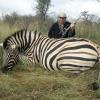

Bear Baiting & Penning in the U.S.
“Bear baiting,” historically refers to the ancient practice of capturing a bear and placing it in an arena with the animal tethered to a post. In many instances, the bear’s teeth and/or claws are removed. Spectators then watch dogs attack the animal until it is killed. This practice dates from the 11th century in England. This practice is a blood sport used for entertainment and gambling, and it was outlawed in England by the Cruelty to Animals Act of 1835. This practice is still to be found in in two countries: parts of Pakistan controlled by warlords who own the dogs, and in many parts of the United States.
Purportedly, an ancient precursor of this baiting practice was found as early as when Alexander the Great observed lions being baited by specially trained dogs. Another cruel variation of this type of blood sport involved using men as the bait. There are reports of “man baiting” in the early 19th century in England.
“Bear baiting” may also be used for the hunting practice of luring a bear with bait to an arranged spot. The hunter places an amount of food every day at a given spot until the hunter notices the food is being taken each day, accompanied by bear tracks. Thereupon, the hunter at his leisure may either kill the bear or capture it for further use in bear baiting, which may also be referred to as “bear penning”
Of particular interest is State of South Carolina. Through a loophole created by clever terminology, "hunters" in South Carolina are permitted to sentence bears to a lifetime of torture. These majestic animals are rendered defenseless by their owners...first they are declawed and have their teeth pulled, and are then chained or tethered to a pole in the middle of a pen. Finally, they are left to endure the relentless attacks of trained hunting dogs while spectators watch and cheer. The bears suffer years and years of barbaric torture in order to "train" hunting dogs.
Coyote and Fox Penning WATCH THE VIDEO
Penning is a blood sport in which dozens of dogs compete in a fenced-in area to chase and rip apart foxes and coyotes. The ordeal of these animals start when the steel jaws of a leghold trap snap shut on a coyote or fox. A trapper then removes them from the trap and pack them into cages with other equally injured animals. They are then transported to other areas, even states, with no food or water so they can be used in pen sessions. Once in a pen, a coyote or fox already stressed and wounded will have to run for their lives with no chance of getting away. Dogs are encouraged to attack and kill these animals to entertain individuals who take pleasure in seeing animals writhe in agony as they are torn apart alive. They travel from state to state to do bettings on their dogs.
According to our most recent information, states where coyote or fox penning is or may be legal include: Alabama, Arkansas, California, Delaware, Georgia, Iowa, Illinois, Indiana, Kansas, Louisiana, Maryland, Mississippi, New York, Ohio, Oklahoma, South Carolina, South Dakota, Tennessee, Texas, Virginia, West Virginia, and Wisconsin. Although most of this type of “penning” occurs in the midwest and south, it may occur in any state that does not specifically prohibit the practice. The only state that has definitely abolish these practices is the state of Florida. There is no federal law that addresses these crimes and each state maintain very general rules that do not offer much protection to the wild canidae.
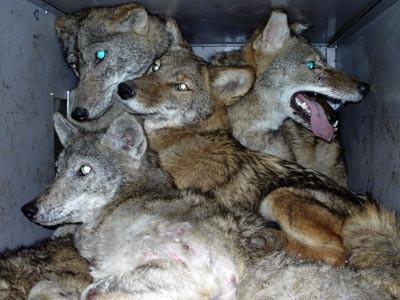
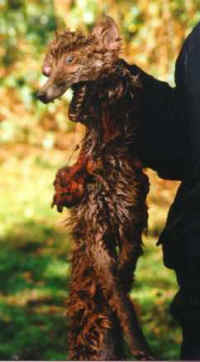

Fur Trapping in the U.S. WATCH THE VIDEO
Trapping has been banned in over 85 countries in the world. But in the United States despite the fact that most Americans oppose its use, it is still largely protected by law with the exception of 8 states, which have prohibited or greatly reduced its use.
More than sufficient documentation proving that leg hold traps barbarically mutilate wild animals, are non-selective in what they catch, are a danger to companion animals and children. Nevertheless, countless trapping licenses are issued each year to families that not only expose their children at tender ages, to the gruesome acts, but indeed teach them to trap and kill animals as if they were mere inanimate objects.
Each year millions of animals are trapped in the wild for fur and also for penning which is a sadistic entertainment much appreciated among hunting crowds. The most common tools by fur trappers are leg hold trap, the body grip (Conibear) trap, and the wire snare. Traps used for beaver, muskrat, and mink are set in the water and are meant to kill animals rather then restrain them. It takes a beaver up to 20 minutes to die under water.
The suffering inflicted on trapped animals is intense. When the trapper decides to kill the animals on the spot, it is a blessing for the animal even when the killing is one of the most inhumane: Shooting to the head of the animal, stomping on their necks or breaking their skull with a stick. But many are dumped in cages with their open wounds and transported for many hours to be penned and finished off by dogs trained to tear fur bearing animals to pieces while still alive.
When trapped, the animal is surprised, painfully gripped and restrained alive. Not infrequently, the animal is clamped on a part of the body that is excruciatingly painful, such as on an eye, the muzzle, or the abdomen.
In an agony of pain and confusion, the animal struggles in a frenzy, often mutilating themselves, dislocating joints, breaking their teeth, chewing their leg or paw in an attempt to break free. If they succeed, the traumatized animal has scant hope for survival in the wild; death will come surely by infection, by starvation or by the animals being an easy prey to their predators. Trappers have a name for the phenomenon of animals chewing off their own extremities to escape; they call it "wring-off". To the trapper, it means they have lost a pelt.
For the animal unable to break free, death is no kinder. Exhaustion is the kindest possibility, but there are other, grimmer modes of death in the trap. The laws pertaining to checking the traps vary from place to place and most require trappers to check their traps within 72 hours. However, the law is not enforceable and many trappers do not check them regularly. An animal who does not die quickly is faced with excruciating pain and panic-filled wait while they die of a painful death by starvation and lack of water.
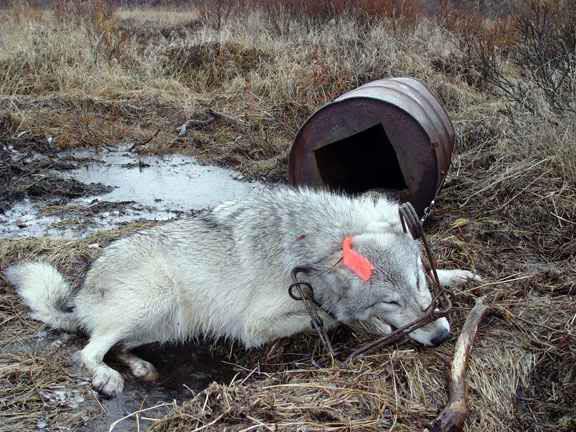
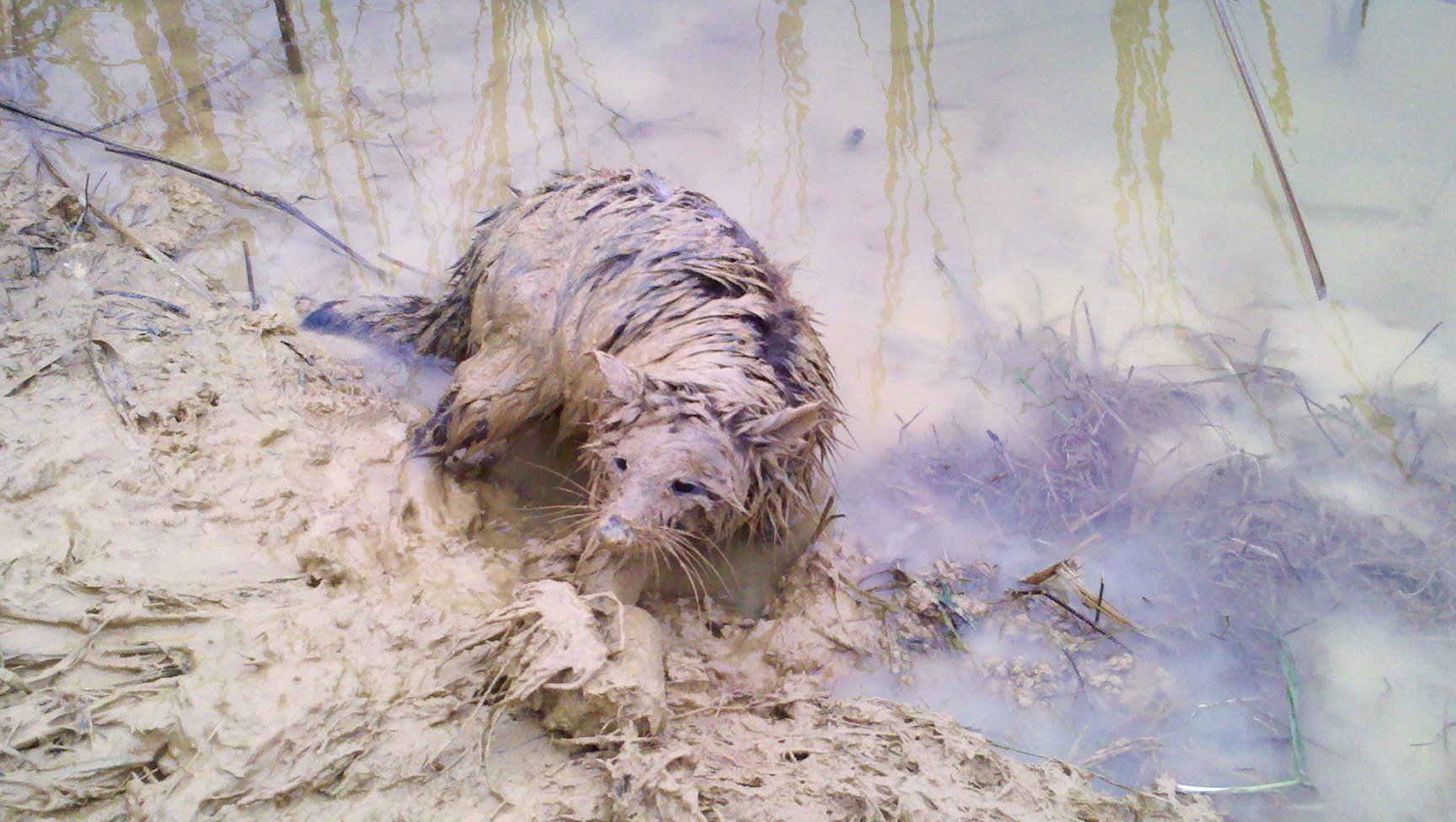
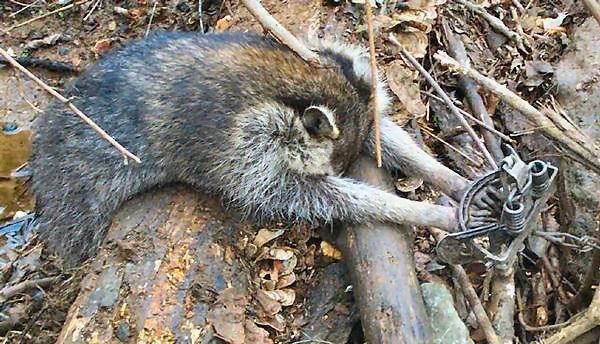
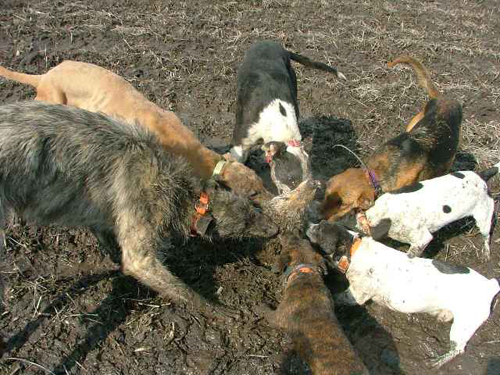
No sentient
being should
have to endure
such a blatant
disrepect for
his/her life!
Canned Hunting & Trophy Hunting
Trophy Hunting is the selective hunting of wild game animals not in enclosures. Every year, thousands of wild animals, representing hundreds of different species, are killed by American trophy hunters in foreign countries. The body parts of most of these animals are legally imported to the United States by the hunters as long as they are not protected under the “Endangered and Threatened Species Act.” However, if the foreign government allows the animals to be killed, as many do, the American hunter can import the trophies. In the last year of his presidency, President Obama outlawed the importation of exotic animal parts described above, however, President Trump is overturning it.
Canned hunting is a blood sport that consists of hunting captive animals in enclosures which offer them no chance of escape. Canned hunters pay large sums of money to participate in such hunts, and many operations allow their clients to hunt animals via the internet. The victims are exotic animals, including a large variety of animals from Asian and African countries. The animals are sometimes tame exotic mammals; some, in fact, have been sold by petting zoos to the canned hunting operation. Canned hunts represent big business for private breeders, animal dealers, and less than reputable zoos.
The animals involved are often hand reared and are not fearful of humans which make them easy prey as they may walk to a human expecting food, but receive a bullet instead. The industry thrives in both North America and South Africa. This non-sport, which is akin to the proverbial “shooting of fish in a barrel”, allows non-sportsmen to make the disingenuous claim of having taken a lion’s head as a trophy.
Most states in the US allow canned hunting except California, Indiana, Maryland, Nevada, New Jersey, North Carolina, Oregon, Rhode Island, Wisconsin, and Wyoming that have laws prohibiting the hunting of exotic mammals in enclosures. There is no federal law that governs canned hunting, and it does not prohibit private ownership of endangered animals and may even allow the hunting of endangered species.
If you would like to learn more about the immense business that is involved in trophy hunting, visit the Safari Club International: http://www.scifirstforhunters.org/
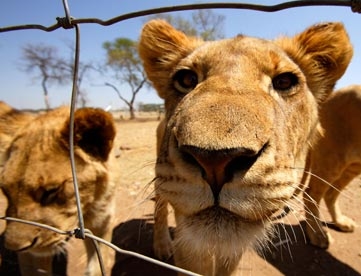
Click on thumbnails to enlarge photos:

This guest book is full!
This is the New guest book!
Please sign our 2 petitions.
PETITION 1: BAN PENNING & BEAR BAITING IN THE US
PETITION 2: BAN FUR TRAPPING ON PUBLIC LANDS IN THE US
Bloodsport is any sport involving killing or the shedding of blood as bullfighting, cockfighting, trophy hunting, trapping, penning and bear tethering. Bloodsports such as trapping, penning, and bear tethering do not attract attention from the public at large because it is practiced away from residential areas and/or foot traffic. Therefore, individuals who commit these savage acts of cruelty feel comfortably free to inflict atrocious suffering on sentient beings as a way of entertainment. Protected by the law, these groups enjoy seeing animals writhing in agony as they are torn apart, still alive, by dogs trained specifically to attack fur bearing animals. The animals most used are Coyote and Fox which are trapped and penned while bears are baited, tethered and penned. WHY is cock or dog fighting outlawed while other canine species such as coyotes and foxes are NOT protected under the law? Penning of any kind should be outlawed and offenders should be prosecuted. Bear baiting/ penning has been outlawed worldwide, except in few countries such as Pakistan.
Other petitions & Information:
Bear baiting in Pakistan
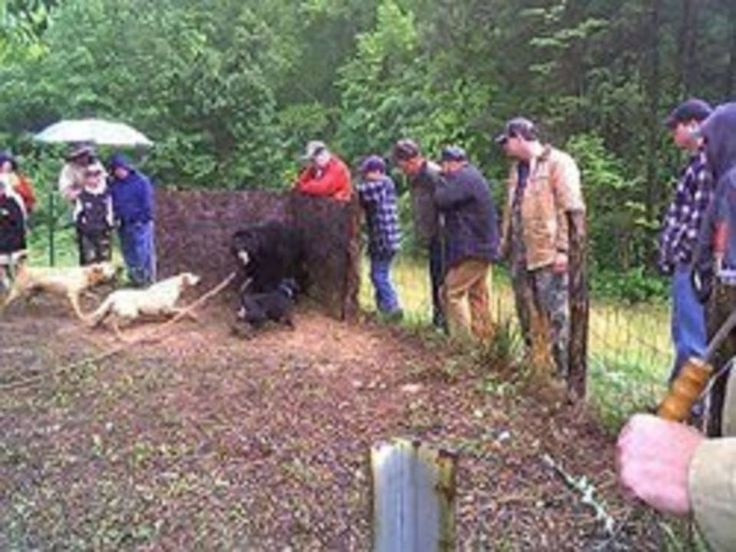
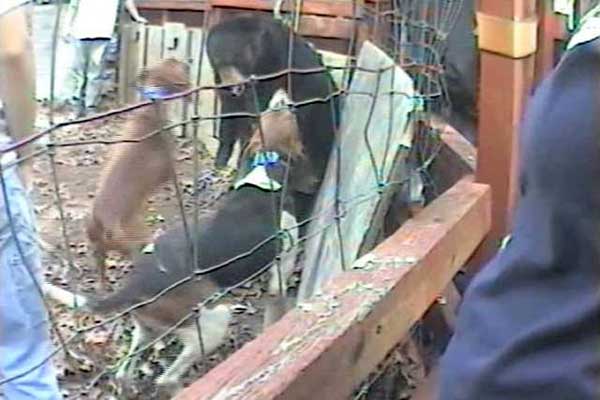
Bear baiting in the US
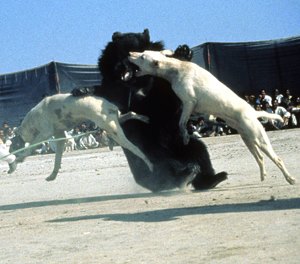
The question is not, “Can they reason?” nor “Can they talk”?” but rather “Can they suffer?”- Jeremy Bentham
Bear baiting in Pakistan
IMPORTANT NOTICE:
The Anti-Fur Society is an affiliate of the
Fur Free Society FurFreeSociety.org,
501 (c) (3) organization.
P.O. Box 40, Hockessin, DE 19707


